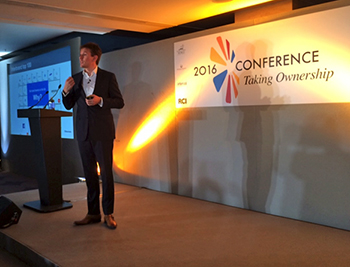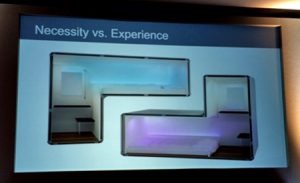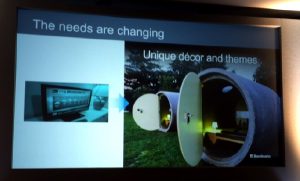RDO7: Thomas Landen – Today’s traveller in a digital world
Thomas Landen, head of Marketing EME for Revinate, gave RDO7 delegates a heads-up on the modern traveller and the huge influence the digital world is having on the real one.
The travel industry today bears little resemblance to the industry it once was, prior to the revolution of technology, he explained. It is constantly adapting as expectations and priorities of travellers continue to change, which poses challenges for businesses. Revinate advises hospitality companies across the globe on their digital strategy, and Landen shed light on the effect the modern traveller has on the industry and what the typical traveller is looking for today.

Thomas Landen at RDO7
The customer perspective
Landen began by explaining that our perspective shifts as our role changes. For example, as a guest at a hotel or resort, we may want different things in order to improve our holiday experience. As a professional in our day-to-day roles, we may not recognise those elements – and things we could improve on. “We need to step out of our day-to-day perspectives. If I arrive at my hotel after a long-haul flight, I expect to be served an omelette if I want one and not to be told it is outside of kitchen opening hours.
“The traveller today has high expectations and a zero tolerance for failure. The generation that was once using hostels is now using hotels – they are experienced with travelling and they know what they want. There is a change of control in the industry, the customer wants to take charge of their hospitality experience and the industry has to adapt to that,” he said.
Landen used mobile banking as an example – consumers rarely need to go into their branch for their banking needs as all the options are at their fingertips on their mobile phones. In the same way, travellers also want to have access to various options throughout their stay via their mobile phones instead of dealing with the front desk for all their queries and requests.

The interior of City Hub
Personalisation
More than 78% of consumers want some form of personalisation with their hospitality product, he claimed. At present, millennials make up 32% of travellers, a figure that will rise to 50% by 2025 – the market is changing and travellers are in search of a unique hospitality product with innovative themes, rooms, and services. City Hub in Amsterdam delivers across all of those requirements, not only providing central accommodation but also a social experience for guests to share, engage and benefit from 24/7 hosts to show them around the city. As a result City Hub has soared into high scoring reviews on Booking.com, Trip Advisor and Facebook with guests sharing photos, videos and comments.

The variety of accommodation on offer for travellers
Competing in the market
On average, people consider around seven hotels and resorts when booking a holiday and 93% of people worldwide said online reviews influenced their decision. Online reviews are often neglected by businesses but in reality they will continue to be the main influence among travellers and should in fact be taken care of.
That said, price and location are still major factors on decision making. Almost 59% of consumers in the UK compare prices online before committing to a purchase and the combination of competitive prices along with good review scores will ensure your hotel or resort gets the booking.
What can you do?
While there is only so much that hotels and resorts can do to reduce pricing and deliver special offers, by aligning our organisations to discover who the most loyal guests are we will be able to target the ideal guest to market to. Landen explained that this might not necessarily be the highest paying guest – it is likely to be the guest that engages with your hotel or resort online and returns year or year. Also, by asking your guest exactly what they want from your hotel or resort during or at the end of their stay, each guest is less likely to leave a negative review online.
“We need to learn from what Airbnb tells us about the industry,” he said. “Your potential guests are reliant on reviews and feedback of others so make the most of that opportunity and make sure they have a positive and personal experience. 81% of users abandon their shopping carts instead of making a booking and your hotel or resort needs to have the edge to compete with other businesses.”
In closing, Landen challenged delegates to think outside the box, be quirky and consider what we ourselves would want from our experience at a hotel or resort, to deliver the personal approach.
“21C Museum Hotel [in Louisville, Cincinnati] uses its unofficial mascots, the red penguins, to give guests a personal experience – one that will create memories, bring them amusement and provide a talking point. They even wrap them up in the duvet of a double bed when they know there is only one guest staying in a hotel room.”




